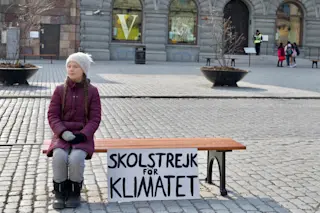Greta Thunberg, a Swedish student who led schoolchildren in a climate change protest. (Credit: Liv Oeian/Shutterstock) If you’ve been following climate news, you’ve probably heard about an approaching “tipping point” toward climate change — the point of no return after enough small changes brought us to certain disaster. But what if the opposite were just as likely? One group of researchers thinks that a few small, positive changes could “tip” us back in the right direction. They’re calling them “sensitive intervention points,” or SIPs for short. And some of them might be inevitable — meaning we might not be as doomed as we think. The interdisciplinary team of researchers at the University of Oxford Institute for New Economic Thinking published their ideas in Science today, explaining a few ways that “a small kick at the right point can trigger a large change” for climate change.
First of all, the team ...














